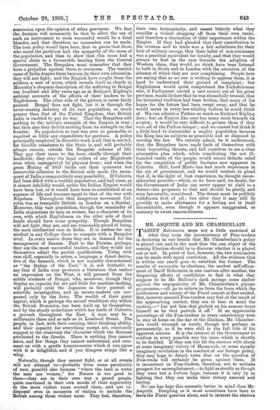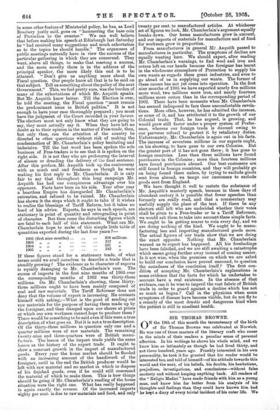T ARIFF Reformers seem not a little exercised at what they
term the inconsistency of Free-traders in declaring in one breath that Mr. Chamberlain's policy is played out, and in the next that the one object of the coming Election should be to discover whether it is played out or not. In point of fact, however, the two statements can be made with equal conviction. All the evidence that is within our reach goes to establish the former. The results of successive by-elections, the modest self-efface- ment of Tariff Reformers in one canvass after another, the despairing efforts of candidates to find in what they suppose to be Mr. Balfour's dark sayings some shelter against the unpopularity of Mr. Chamberlain's plainer programme,—all go to relieve us from the fears which the suddenness and energy of the Fiscal assault at first excited. But, however assured Free-traders may feel of the result of the approaching contest, they are to bear in mind the caution,—" Let not him that girdeth on his armour boast himself as he that putteth it off." If an appreciable percentage of the Free-traders in every constituency were to stay at home on the day of the Election, 31x. Chamber- lain would triumph as surely, though not perhaps as permanently, as if he were still in the full tide of his apparent success. It is the interest of the Government to confuse in every possible way the issue which is shortly to be decided. If they can but fill the electors with alarm at some imaginary victory of Home-rule, or some equally imaginary revolution in the conduct of our foreign policy, they may hope to detach votes that on the question of Free-trade will certainly be given against them. It is incumbent on Free-traders, therefore, not to mistake prospect for accomplishment,—to fight as stoutly as though they were but a forlorn hope, because it is only by so fighting that they can make their victory assured and lasting. No one has kept this necessity better. in mind than Mr. Asquith. Tempting as it must sometimes have been to leave the Fiscal question alone, and to interest the electors in some other feature of Ministerial policy, he has, as Lord Rosebery justly said, gone on "hammering the base coin of Protection to the counter." We can well believe that before making his speech at Edinburgh last Saturday he " had received many suggestions and much exhortation as to the topics he should handle." The organisers of public meetings naturally have in view the success of the particular gathering in which they are concerned. They want, above all things, to make that meeting a success, and the more novelty there is in the address of the principal speaker, the more likely this end is to be attained. " Don't give us anything more about the Fiscal question. Our people know all that is to be said on that subject. Tell us something about the policy of the next Government." This, we feel pretty sure, was the burden of many of the exhortations of which Mr. Asquith speaks. But Mr. Asquith knew better. Till the Election is over, he told the meeting, the Fiscal question " must remain the predominant issue in British politics." It is not enough to have your case thoroughly prepared ; you must have the judgment of the Court recorded in your favour. The electors must not only know what they are going to say, they must actually say it. When they have left no doubt as to their opinion in the matter of Free-trade, then, but only then, can the attention of the country be directed to other questions without risk of making the condemnation of Mr. Chamberlain's policy hesitating and indecisive. Till the last word has been spoken the sole business of Free-traders is to see that it is spoken on the right side. It is not they who are prolonging the interval of silence or dreading the delivery of the final sentence. After this preface, Mr. Asquith took up the controversy with as much zeal and freshness as though he were making his first reply to Mr. Chamberlain. ft is only fair to say that throughout this long campaign Mr. Asquith has had one conspicuous advantage over his opponent. Facts have been on his side. Year after year a heartless Empire has disregarded Mr Chamberlain's entreaties, and refused to be ruined. Mr. Chamberlain has shown it the steps which it ought to take if it wishes to realise the blessings of Tariff Reform, but it takes no heed of his advice. Exports, he says in each speech, are stationary in point of quantity and retrograding in point of character. But then come the disturbing figures which are fatal to each half of this statement. What can Mr. Chamberlain hope to male of this simple little table of quantities exported during the last four years ?— 1902 (first nine months)
... ... 209 millions.
1903 „ „ • • • ... 217 „ 1904 „ „ )2
221
1905 „
»
24
If these figures stand for a stationary trade, of what terms could. we avail ourselves to describe a trade that is steadily growing ? The evidence as to character of exports is equally damaging to Mr. Chamberlain's case. The excess of imports in the first nine months of 1905 over the corresponding months of 1902 was thirty-three millions. On Mr. Chamberlain's showing, these thirty- three millions ought to have been mainly composed of coal and raw materials. The Tariff Reformer does not deny that the volume of export is increasing. He contents himself with asking,—What is the good of sending out raw materials for the purpose of having them made up by the foreigner, and then dumped upon our shores at prices at which our own workmen cannot hope to produce them ? There. would be something to be said even if this were a true description of what goes on. But it is not a true description. Of the thirty-three millions in question only one and a quarter millions were of raw materials. The remaining twenty-nine and three-quarters were of British manu- facture. The lesson of the import trade yields the same lesson as the history of the export trade. It ought to show a constant growth in the import of manufactured goods. Every year the home market should be flooded with an increasing amount of the handiwork of the foreigner, until in the end the British producer would be left with raw material and no market in which to dispose of his finished goods, even if he could still command the material of which to make them. This is how things should be going if Mr. Chamberlain's reading of the home situation were the right one. What has really happened. is again exactly the reverse. Of the increased imports eighty per cent. is due to raw materials and food, and only twenty per cent. to manufactured articles. At whichever set of figures we look, Mr. Chamberlain's argument equally breaks down. Our home manufactures grow in amount, and our imports of materials for manufacture and of food for workmen grow in proportion.
From manufactures in general Mr. Asquith passed to manufactures in particular. The symptoms of decline are equally wanting here. We should. expect, after reading Mr. Chamberlain's warnings, to find wool and iron and cotton left on our hands because the foreigner has learnt in the wholesome atmosphere of Protection to supply his own wants as regards these great industries, and even to go ahead of us in supplying our wants. The former of these causes has not yet come into operation. In the first nine months of 1905 we have exported nearly five millions more wool, two millions more iron, and nearly fourteen millions more cotton than in the corresponding period of 1902. There have been moments when Mr. Chamberlain has seemed indisposed to face these uncomfortable revela- tions. More often, however, he has admitted the increase, or some of it, and has attributed it to the growth of our Colonial trade. That, he has argued, is growing, and would grow still faster under a proper system of Prefer- ence, whereas our foreign trade is doomed owing to our perverse refusal to protect it by retaliatory duties. Unfortunately, Mr. Chamberlain is again out in his facts. The increase of seventeen millions in our exports ought, on his showing, to have gone to our own Colonies. But the greater part of it has not gone there ; it has gone to foreign countries. Less than three millions have found. purchasers in the Colonies ; more than fourteen millions have found purchasers abroad. Our best customers are still found in foreign countries, and they will probably go on being found there unless, by trying to exclude goods sent from abroad, we tempt our customers to exclude goods sent from England.
We have thought it well to restate the substance of Mr. Asquith's masterly speech, because in these days of abundant oratory it is possible that fewer speeches than formerly are really read, and that a commentary may usefully supply the place of the text. If there be any electors still left who are undecided whether their votes shall be given to a Free-trader or to a Tariff Reformer, we would ask them to take into account these simple facts. We ought to be getting nearer to ruin every day, and we are doing nothing of the kind. We ought to be manu- facturing less and importing manufactured goods more The actual figures of our trade show that we are doing the exact opposite. Nothing that Mr. Chamberlain warned us to expect has happened. All his forebodings have been falsified, and we are still awaiting a catastrophe which seems going further away instead of coming nearer. Is it not wise, when the premises on which we are asked to build our conclusion have proved unsound, to question the soundness of the conclusion itself ? The first con- dition of accepting Mr. Chamberlain's explanations is some evidence that the facts for which he undertakes to account have a real existence. In the absence of that evidence, can it be wise to imperil the vast fabric of British trade in order to guard against a decline which has not so much as begun ? Call in the physician when some symptoms of disease have become visible, but do not fly to a remedy of the most drastic and dangerous kind when the patient is still in excellent health.



















































 Previous page
Previous page